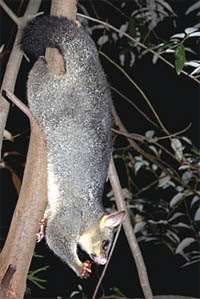New Zealand is being overrun by a pack of possums 30-million strong. The cat-size animals with pointy ears and long bushy tails are eating their way through native forests, destroying habitat and food for rare bird species, and keeping homeowners awake at night with their endless shrieks and whistles as they feast on the family vegetable garden. Introduced from Australia in 1837 by British immigrants hoping to kick start a fur industry, they are creating what some biologists call an ecological disaster. Past efforts to curb their numbers have had limited success.
The possums, marsupials unrelated to the American opossum, have no natural enemies in New Zealand. Even the trees are at their mercy as they munch them to death, while in their native Australia many trees have spines, prickles, and poisonous leaves that keep the possums on the ground. Serendipitously, several businesses are profiting from possum products and at the same time reducing the possum population.
The pelts have always been used in a range of garments for cooler climates, but more recently the fur has been combined with merino wool and silk to make an ultra-soft, lightweight material that has attracted the attention of top fashion outlets. Untouched World, a New Zealand company and the first fashion business to be recognized by the United Nations for sustainability, is selling sweaters, hats, gloves, and socks at their stores and online.
The supple skin of the possum also has been discovered by sports enthusiasts for both golf and rugby. Fila, one of the world’s largest sportswear manufacturing companies, is selling gloves made from possum skin and rave reviews have come from Singapore, Korea, and the United States, among others. As the demand goes up, the number of possums goes down; trappers are back in the forests because providing possum pelts can also provide a good living.
Exterminating possums is usually done with traps or poison. Although considered pests and a danger to the environment, many people, including potential customers, are uncomfortable with these methods. To solve that problem, the company Goodnature, founded by three industrial design graduates, has developed a humane and non-toxic method of killing possums. Their device delivers a fatal blow to the head by a CO² powered piston.
While the battle to protect the birds and forests of New Zealand from an army of voracious, predator-free possums has not been won, the power of markets is joining forces with the Department of Conservation to protect one of the world’s most unique environments.
For more information: www. goodnature.co.nz



